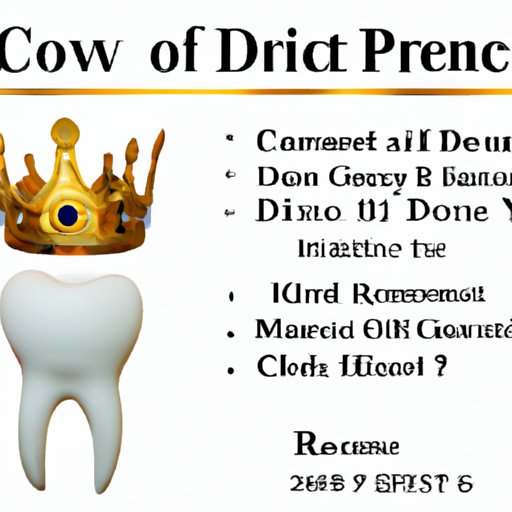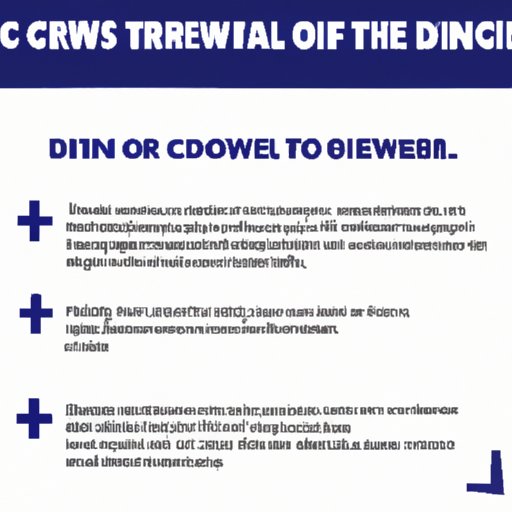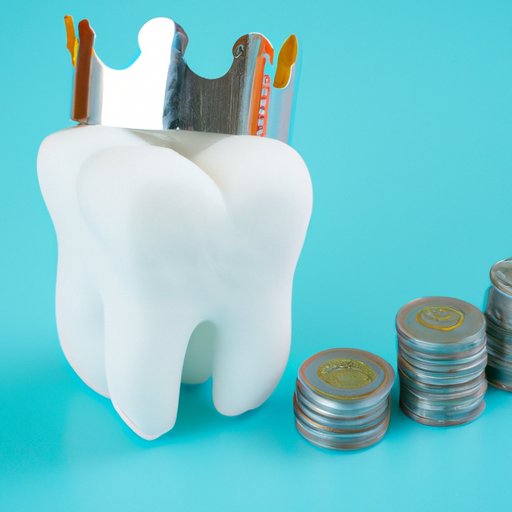Introduction
A dental crown is an effective way to restore the look and function of a damaged tooth. But when considering this treatment option, you may be wondering how much a dental crown costs. The answer depends on a variety of factors, such as the type of material used, the location of treatment, and insurance coverage. In this article, we’ll take a closer look at the cost of a dental crown, explore the different types of crowns available, and discuss the factors that impact the price.

A Comprehensive Guide to the Cost of a Dental Crown
The cost of a dental crown will depend on a variety of factors. Here are some of the most important ones to consider:
Factors that Affect the Cost of a Dental Crown
- Type of Material Used: The type of material used for the crown can have a major impact on the cost. Porcelain-fused-to-metal crowns, all-resin crowns, all-ceramic or all-porcelain crowns, and gold crowns are all common options. Each of these materials has its own pros and cons, and the price will vary depending on which one you choose.
- Location of Treatment: The cost of a dental crown can also vary depending on where you get it done. For example, the average cost of a dental crown in the United States is around $1,000, while the same crown may cost up to $2,500 in Canada.
- Insurance Coverage: Your insurance coverage can also affect the cost of a dental crown. If your insurance covers the procedure, it could reduce the amount you have to pay out of pocket. Be sure to check with your provider to see what your plan covers.
Average Cost of a Dental Crown
According to the American Dental Association (ADA), the average cost of a dental crown ranges from $800 to $1700. However, this number can vary significantly depending on the type of material used, the location of treatment, and insurance coverage.
The Different Types of Dental Crowns and Their Costs
When it comes to the type of material used for a dental crown, there are several options to choose from. Here is an overview of the different types of crowns and their average costs:
Porcelain-Fused-to-Metal Crowns
Porcelain-fused-to-metal (PFM) crowns are made from a combination of metal and porcelain. They are strong and durable, and they can be color-matched to blend in with the surrounding teeth. The average cost of a PFM crown is around $800 to $1,200.
All-Resin Crowns
All-resin crowns are made entirely of plastic. They are less expensive than other types of crowns, but they are not as strong and may not last as long. The average cost of an all-resin crown is around $600 to $800.
All-Ceramic or All-Porcelain Crowns
All-ceramic or all-porcelain crowns are made entirely of ceramic or porcelain. They are aesthetically pleasing and can be color-matched to blend in with the surrounding teeth. The average cost of an all-ceramic or all-porcelain crown is around $900 to $1500.
Gold Crowns
Gold crowns are made from a combination of gold, copper, and other metals. They are strong and durable, but they are also more expensive than other types of crowns. The average cost of a gold crown is around $1,500 to $2,500.
What Factors Affect the Cost of a Dental Crown?
As mentioned above, the cost of a dental crown can vary significantly depending on a variety of factors. Here is a closer look at the three main factors that impact the price:
Type of Material
The type of material used for the crown is one of the biggest factors that will affect the cost. Porcelain-fused-to-metal, all-resin, all-ceramic or all-porcelain, and gold crowns are all common options, and each of these materials has its own pros and cons. The cost will vary depending on which one you choose.
Location of Treatment
The location of treatment can also have an impact on the cost of a dental crown. For example, the average cost of a dental crown in the United States is around $1,000, while the same crown may cost up to $2,500 in Canada.
Insurance Coverage
Your insurance coverage can also affect the cost of a dental crown. If your insurance covers the procedure, it could reduce the amount you have to pay out of pocket. Be sure to check with your provider to see what your plan covers.
Exploring the Cost of a Dental Crown: Is It Worth the Investment?
When exploring the cost of a dental crown, it’s important to consider the benefits of the treatment as well. A dental crown can protect a damaged tooth from further damage and restore its look and function. It can also help preserve the structure of the tooth and prevent future problems.
However, it’s important to keep in mind that a dental crown is a significant financial investment. It’s important to weigh the advantages and disadvantages when comparing costs. Be sure to talk to your dentist about the different options available and how they might fit into your budget.

How to Get the Most Value From Your Dental Crown Investment
Once you’ve decided to invest in a dental crown, there are a few things you can do to get the most value from your investment. Here are a few tips:
- Ask Questions: Make sure you understand all of the details of the procedure before you commit. Ask your dentist any questions you may have about the cost, the procedure, and the potential risks and benefits.
- Research Different Options: There are many different types of dental crowns available, so make sure you research your options before making a decision. Consider the pros and cons of each type of crown and how they will fit into your budget.
- Maintain Good Oral Hygiene: After getting a dental crown, it’s important to maintain good oral hygiene to get the most value from your investment. Brush and floss regularly and visit your dentist for regular checkups.
Conclusion
A dental crown is an effective way to restore the look and function of a damaged tooth. The cost of a dental crown can vary significantly depending on the type of material used, the location of treatment, and insurance coverage. Porcelain-fused-to-metal, all-resin, all-ceramic or all-porcelain, and gold crowns are all common options, and each of these materials has its own pros and cons. When exploring the cost of a dental crown, it’s important to consider the benefits of the treatment as well. To get the most value from your investment, be sure to ask questions, research different options, and maintain good oral hygiene.
(Note: Is this article not meeting your expectations? Do you have knowledge or insights to share? Unlock new opportunities and expand your reach by joining our authors team. Click Registration to join us and share your expertise with our readers.)
